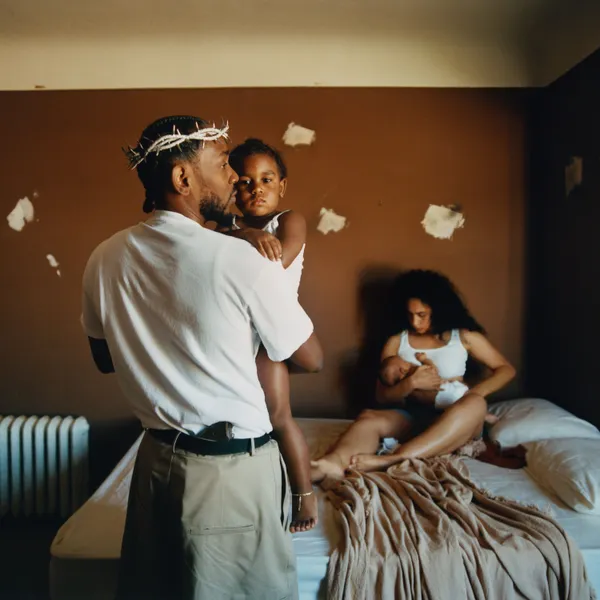
Kendrick Lamar is an exuberant playwright. He enjoys cramming as many viewpoints as possible into his songs, giving each of his many characters and muses their own individual voices, cadences, and rhythm changes that make them come to life. He is the first and only rapper to have received a Pulitzer Prize, and his acrobatic tics have made him one of rap’s most renowned storytellers and stylists. On his fifth studio album, Kendrick rejects the position that some have given him as the greatest moral authority in hip-hop thanks to his supple narrative and outraged reports on Black existence. With Mr. Morale & The BigSteppers, Kendrick spends the album happily destroying his prized image. He alternates between scathing jabs and wistful confessions over smooth funk and soul music that sparkles like shattered glass. Aiming to explore Kendrick’s most mysterious character—himself—the double album presents rap’s most startling heel flip since Future let free on Monster.
Writing in hasty strokes and sketches that reflect his clumsy confessions, Kendrick seems to purposefully disregard the beauty and organization of earlier songs like “DUCKWORTH” and “good kid” for the whole of Mr. Morale & The Big Steppers. Ideas scurry around like field bunnies, and he avoids clear hooks, making it difficult for the listener to understand what he is thinking. It almost seems antipop. His flows dance with the chords and bounce off the kick drum in “Count Me Out.” The “Kim”-inspired song “We Cry Together” creates a vile melodrama as TaylourPaige, who plays Kendrick in the Kendrick and Zola movie, trades insults that seem almost impromptu while being carefully rhymed and timed. Finally, Eminem can enjoy his retirement.
The production, which is smooth yet crooked with rhythms and chords spiled dangerously, reflects his dedication to messiness. Many of the tracks, the majority of which have at least three producers, seem to be falling apart. Piano lines by Duval Timothyon’s “Rich (Interlude)” separate and recombine like rain turning to vapor than to clouds. For the whole of Ghostface’s excellent stanza on “Purple Hearts,” the drums disappear, with strings and brief piano splats edging the rapper’s meter. The vocals don’t always take advantage of the production’s lushness, but the rhythms and the sporadic R&B samples give the lyrics, which are sometimes meandering, the much-needed structure.
As if Ice Cube’s “Cave Bitch” and Eldridge Cleaver’s Soul on Ice crossed over, Kendrick’s verse, rapped in the tight pockets of a throbbing vamp, steamrolls into trolling lyrics that recount spiteful rendezvous with white women. In the context of the song, which portrays Kendrick’s Becky urges as one thread in the worldwide fabric of flawed individuals who ignore and avoid their defects, the bars aren’t especially provocative. But there is a current throughout the record that suggests that Kendrick enjoys teasing the listener.
He tries the former but stumbles into the latter in “AuntieDiaries,” the story of two relatives whose experiences with gender affected his responsibility to his family. He makes himself the main character in the tales of his homosexual ancestors and uses the f-slur willfully in an effort to teach a lesson about how he first learned and then unlearned to speak the slur. Although his goals are apparent and few rap listeners will be unfamiliar with the term, aren’t there more tales he may share about the transpersons in his life? Although Kendrick has never been a flawless character actor, in the past he at least gave parts a distinct personality.
The concluding song, “Mother I Sober,” has Kendrick’s lengthy response to Whitney’s original directive. He tells a somber story of how marital and family violence trapped him, his relatives, and his mother. His voice drops to a tearful mutter. Instead of graphic descriptions, the narrative centers on stone silences that limit everyone to their heads, where they bottle up their anguish rather of than deal with it. Beth Gibbons of Portishead mumbles the song’s hook, “I wish I was somebody/Anybody but me,” her ghostly tonality conveying the dissociation the violence has caused.
Ironically, Mr. Morale & The Big Steppers never choose to portrayKendrick in any of their angry positions and declarations, frequently astounding rapping, meticulous attention to detail, or themes of self-affirmation. The album’s main theme may be that slipperiness; it might be seen as his response to a question he posed a decade before, before being designated as hip-conscience: hop’s “If I divulged all my skeletons, would you jump in the seat?”The fear of having trauma and shame define one’s identity permeates the entire album, but Kendrick and his flaws are defined by rejection—of white gazes, Black Twitter, and heavy listener expectations—that by the time the record’s conclusion, Kendrick’s “me” is just as hazy as the effigy he’s spent the entire record slaying. Gods are created in voids.














